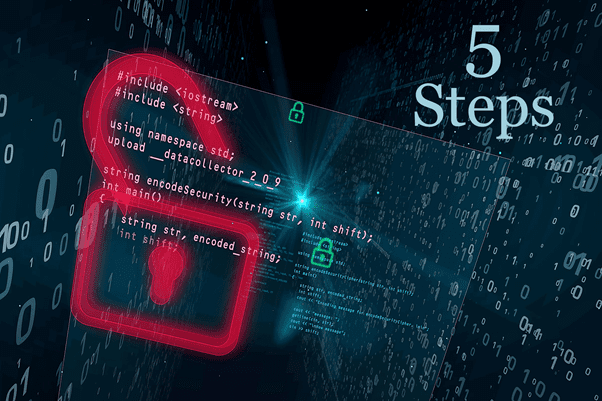Five Key Steps to Protect Your Business from Data Breaches in the Financial Sector

Financial sector data breaches are happening with greater intensity and frequency than ever before, but it is foolish to believe that cybercriminals are only going after the ‘big guys’. For every data breach at a big corporation, there are possibly thousands of breaches awaiting SMEs.
Quite possibly one of the greatest forces in the business cycle is the power of entrepreneurs to creatively disrupt the status quo, especially in the IT and tech industry. Innovative technologies that provide superior quality services to the masses at far more competitive costs than what the big corporations offer spur the boom cycles and force corporations to adapt.
Perhaps one of the most powerful and unethical forms of entrepreneurship comes from cyber criminals, who can identify weaknesses and exploit them for their own malicious purposes.
With the rapid growth and ascendance of digitization in business like mobile phones, digital payment processors, remote work, and decentralized offices, coupled with many businesses having inadequate IT Asset Disposition procedures, cybercriminals have many avenues to engage in criminal behavior and potentially cause a catastrophic data breach.
Financial Sector
Four out of five financial institutions had reported an increase in cyberattacks in 2020, according to a survey by VMware. 27% of cyberattacks targeted the healthcare or financial sector.
During Q1 2020, the financial sector experienced a nine-fold increase in ransomware attacks. Attacks against the financial sector had increased by an incredible 238% as the global pandemic arrived in the US.
This raises important questions regarding cybersecurity and data security best practices. It is imperative that organizations try their hardest to always keep one step ahead of cyber criminals.
How can the financial sector reduce cybercrime and prevent data breaches? The following five steps are imperative:
1. Training
Every good security policy should be introduced to relevant employees and colleagues via training and workshops. No matter how robust the security, human error contributes to a major source of data breaches. It is essential to train your staff to identify trends in phishing, for example. Risk management teams should also play a large role in creating simulations of real-world threats in cybersecurity.
2. IT Asset Register
Back in the good old days, keeping track of all IT assets within the organization was far easier than it is in today’s mostly remote workforce. Whereas in years past, most IT assets were located within the office, today’s laptops, cell phones, and other equipment are regularly kept remotely in private homes far away from the office. This places a much greater emphasis on robust, accountable IT asset tracking either from your own IT department or from a reputable IT asset disposition (ITAD) provider like Wisetek. Either way, it is essential to implement a reliable ITAD strategy to physically check, track, and evaluate the condition and value of remote IT assets.
3. Bring Your Own Device (BYOD) Policy
In the early weeks of lockdown, many offices scrambled to put together work from home arrangements for their employees. Often, many offices permitted employees to use their personal devices to access company data servers, but this carries a great potential for risk. It seems that remote work is here to stay, so it is crucial that your organization put together a framework regarding personal devices such as a bring your own device (BYOD) policy. Clearly outline whether personal devices can be used to interact with company resources, and if so, how are you managing the potential risk?
4. Draft A Response Plan
Even with a robust cybersecurity strategy, there is always a risk of a data breach affecting your organization. That is why it is important to have a response plan in place to handle the breach and to mitigate the disaster as much as possible. The following steps are recommended: shut down your systems immediately after detecting the breach; investigate whether data was compromised or stolen, then notify any individuals affected immediately; call in cybersecurity experts to thoroughly analyze the systems to confirm that the attack has ended.
5. Data Storage and Data Destruction
How and where you choose to store your data and how it is disposed of are crucial to reducing the risks of data breaches. Whether your organization stores data on the cloud or in on-premises data centers, you must ensure that the storage method is secure and up-to-date. When IT assets reach the end of life (EoL), they must be disposed of in a safe and secure manner. ITAD guidelines for data destruction are a great place to start.
For example, consider whether you require that your IT assets be shredded or degaussed on your premises. Alternatively, off-site data destruction may be necessary. How do you intend to recycle or dispose of any electronic waste? There are many laws and regulations in place in the US for data disposal and electronic waste, so it is important that you remain compliant.
Cyberattacks today are far more prevalent simply because our modern digital world is constantly interconnected and sensitive data is being stored, collected, and shared on vulnerable systems. The financial sector stands to lose far more than money from a breach as reputational damage is extremely difficult to recover from. There are many important methods of minimizing the risk of data breaches, but education, awareness, robust policies and a sound ITAD strategy are essential.
For more information, please contact enquiries@wisetek.com or visit our website.





